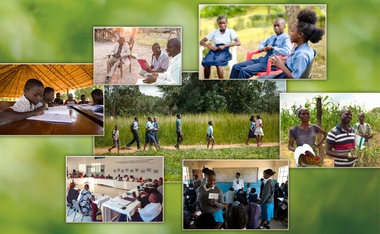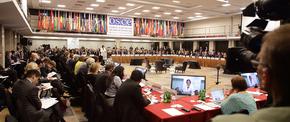This past month, the Baha’is of Zambia have been occupied with a pivotal question: How can the range of Baha’i educational initiatives in that country offer a seamless, coherent experience from early childhood into adulthood?
Baha’i institutions and Baha’i-inspired organizations in Zambia gathered recently for five days in Lusaka to take an expansive view of the various educational undertakings in that country which have been unfolding over several decades.
Musonda Kapusa-Linsel, a member of the Continental Board of Counsellors in Africa, describes the significance of the gathering, saying: “This seminar allowed agencies involved in promoting spiritual and material education in Zambia to come together for the first time and gain a deeper appreciation for the full spectrum of initiatives in the country, exploring possibilities for much closer collaboration in their efforts.”
Mrs. Kapusa-Linsel explains that the dynamic discussions opened thrilling new vistas and have enabled participants to see their endeavors as contributing to a single goal—to awaken the energies latent in the human soul and channel them toward the betterment of their neighborhoods, villages, and ultimately their society.
An Educational System in a State of Constant Refinement
Hamed Javaheri, another Counsellor from Zambia, explains that in order to chart a path for the future, participants agreed that it was important to articulate a shared understanding of the journey of the burgeoning educational system thus far.
To do this, participants looked at experiences with educational efforts for spiritual and moral empowerment, academic education, and educational initiatives related to social and economic development. A document prepared by the Baha’i National Spiritual Assembly of Zambia provided an opportunity for attendees to see all these endeavors in one light, capturing insights and experiences from the past twenty years of effort. What quickly became apparent was that what has emerged is an educational system in a state of constant refinement.
The story begins in 1983 when a training institute concerned with moral education was first established.
“With a focus on building capacity for service to society, this early institute provided the foundations for community-building endeavors as well as all subsequent educational initiatives,” says Mr. Javaheri.
He describes how this institute, which has since been decentralized into four institutes serving the many regions of Zambia, brought together people of all ages in small groups to explore Baha’i principles—such as the oneness of humanity, the equality of women and men, the importance of a life of service to society, and consultation—and to gain practical experience in applying these principles to neighborhood and village life.
As participation in the moral empowerment programs of the training institutes grew over the years, so did the desire and capacity of people to offer more complex service to their communities. This rising capacity, explains Mr. Javaheri, paved the path for exploring additional educational imperatives, namely those concerned with academic education, as well as initiatives related to social and economic development.
Many Educational Initiatives, One Overarching Goal
The discussions in Lusaka enabled attendees to see that although there are many Baha’i educational initiatives in Zambia, they all share an overarching goal. Mohamed Abdou-Salami of the Inshindo Foundation, a Baha’i-inspired organization, states: “The operating principle of all these initiatives is faith in a population’s ability to be the protagonist of its own material, spiritual, and intellectual advancement, not just recipients or mere participants.”
Attendees of the gathering saw how the moral empowerment programs of the training institute recognize and help to cultivate a desire for knowledge, education, and service.
The skills and abilities gained through the training institute have also enhanced the experience of young people who have participated in another educational initiative: Baha’i-inspired primary and secondary schools established by people who have been trained by the Inshindo Foundation. These community schools nurture a thirst for academic excellence in students and orient them toward service to their fellow citizens. Since the mid-2000s, a network of 63 schools has emerged in that country, particularly in rural and peri-urban areas, where educational opportunities for young people have historically been limited.
Mr. Javaheri notes that these community schools are typically formed in places with capacity to sustain large numbers of Baha’i community-building activities. Such communities enable schools to be established on firm foundations, with support from parents, trained teachers, and Baha’i Local Spiritual Assemblies, in collaboration with community leaders, and in some cases with government agencies and civil society organizations.
Another academic initiative is the Banani International School. Established in 1992, it offers quality secondary education to Zambian girls focused on moral and intellectual excellence. The school is learning to combine an international curriculum with a character development program that draws on Baha’i educational materials.
As youth enter their secondary studies and develop a heightened awareness of social issues, they are introduced to the Preparation for Social Action (PSA) program, which is implemented by the Inshindo Foundation.
Mr. Abdou-Salami explains that PSA raises capacity in young people to apply knowledge drawn from both science and religion for the development of their communities in areas including education, agriculture and sustainable food production, health, and the environment.
“Participants of the PSA program come to see the development of their community as something they can shoulder. They are not waiting around for help from people outside. They identify needs and they take action to address those needs,” he says.
He adds that participants learn to initiate agricultural projects, establish preschools, design environmental health campaigns and activities, and start small businesses.
As these young people approach tertiary education, some require additional academic assistance to excel in their university studies. The newly established Lomthunzi Foundation seeks to address this need through a tutorial program that provides students with complementary classes in science, mathematics, and English.
Chungu Kapusa, of Lomthunzi, says: “The Lomthunzi Foundation also provides students with career advice, accompanies them through vocational training schools, colleges, and universities, and assists students with pursuing professions that allow them to give back to their community.”
Upon entering tertiary education, the youth who have gone through these educational initiatives experience an ever-deepening desire to understand social reality in light of Baha’i principles. It is then that the Institute for Studies in Global Prosperity offers undergraduate seminars, which acquaint university students with a Baha’i perspective on issues relevant to social progress. Among the aims of these seminars is to assist participants to see their university education as integral to their efforts to contribute to the transformation of society.
Advances in Culture
Among the insights gained at the national gathering in Lusaka was the early signs of the impact of the Baha’i educational initiatives on the culture of some rural areas, particularly in places where social or cultural barriers may be impeding the educational experience of youth.
Cllyv Lengwe, of the community schools program, says: “As parents and the wider community interact with the different educational programs of the Baha’is of Zambia, their understanding of the importance of both intellectual and spiritual education grows.”
Pauline Kaumba, a regional coordinator of the training institute in the North-Western Province, elaborates: “In some villages, girls lack support in their education and feel pressure from traditional customs about early marriage.
“But as these girls participate in the educational programs of the Baha’i community and undertake social action, their parents and families see something different; their mindset about early marriage shifts.
Ms. Kaumba adds: “These young women continue their education and come to see themselves as agents of change, as people who can really contribute to the development of their village.”
Living a Coherent Life
Ms. Kapusa, of the Lomthunzi Foundation, explains that all these interlocking educational imperatives—developing spiritual and moral capabilities, promoting academic excellence, and raising capacity for social action—are enabling young people to channel their creative and intellectual abilities to enrich the social, economic, and spiritual life of their society.
She says: “These young people are learning about living a coherent life—that studying while serving their fellow citizens is possible. Upon completing their tertiary education, they come back to contribute to the development of their communities through their profession.”
Extending the Conversation to the Grassroots
Mrs. Kapusa-Linsel explains that the national discussion in Lusaka was the first of many that will now continue at the local level, particularly in neighborhoods and villages.
Those discussions, the first of which has already taken place in the village of Katuyola in the North-Western Province, will bring together entire families, teachers, traditional leaders, and other social actors to explore how they can strengthen the foundations of existing initiatives, addressing the intellectual, moral, and spiritual aspirations of their communities from primary through to tertiary education.

















Comments
Sign in or create an account
Continue with Googleor